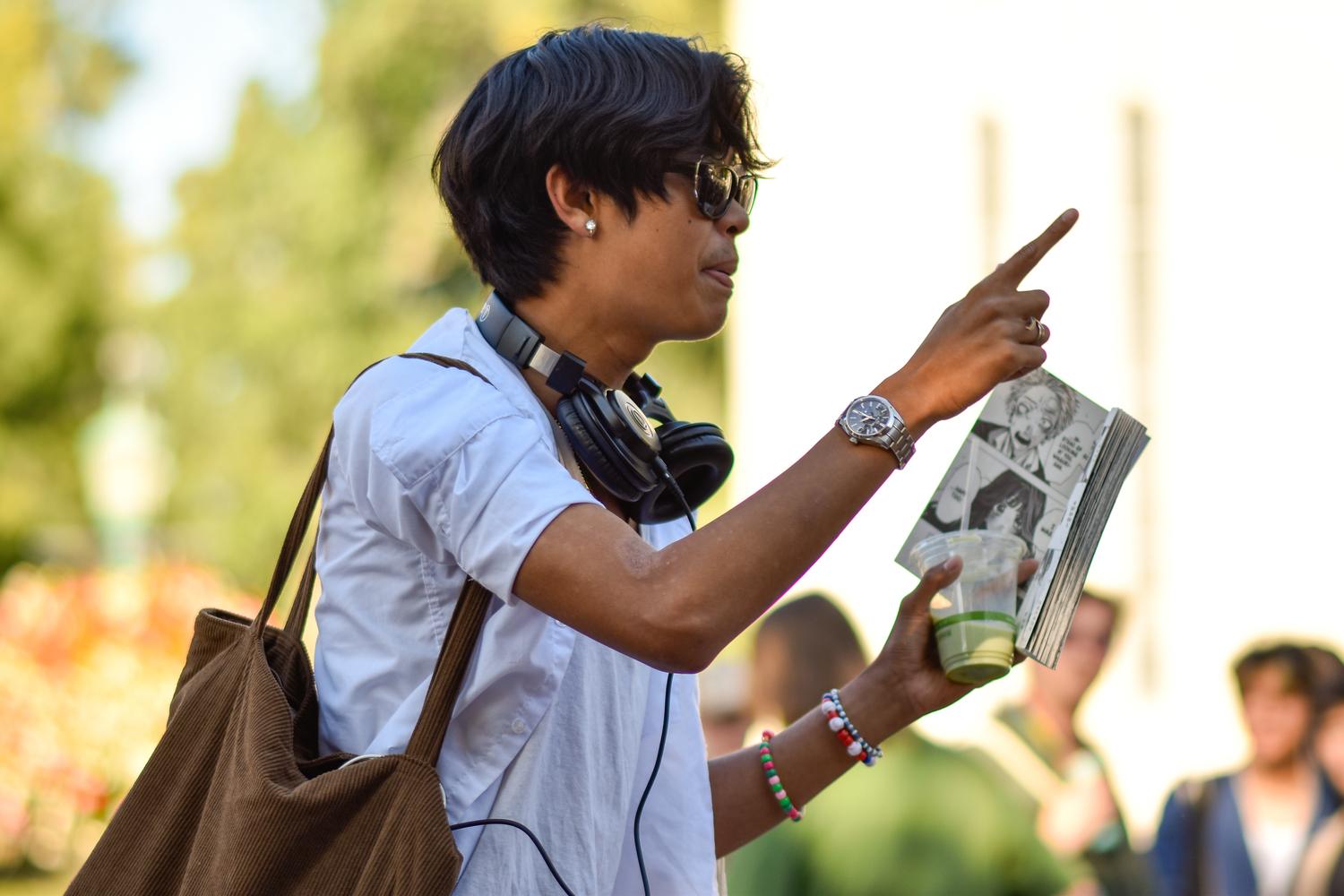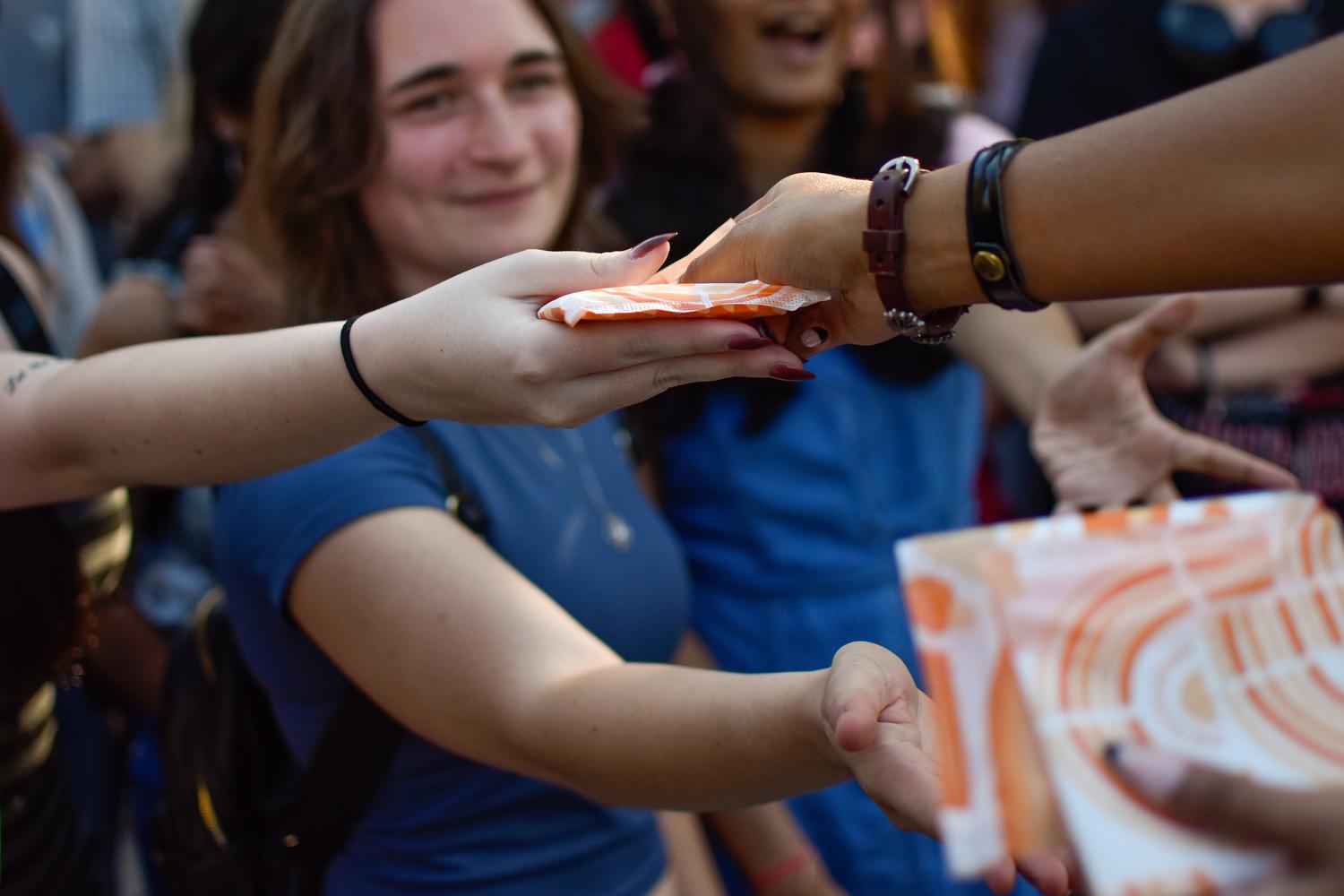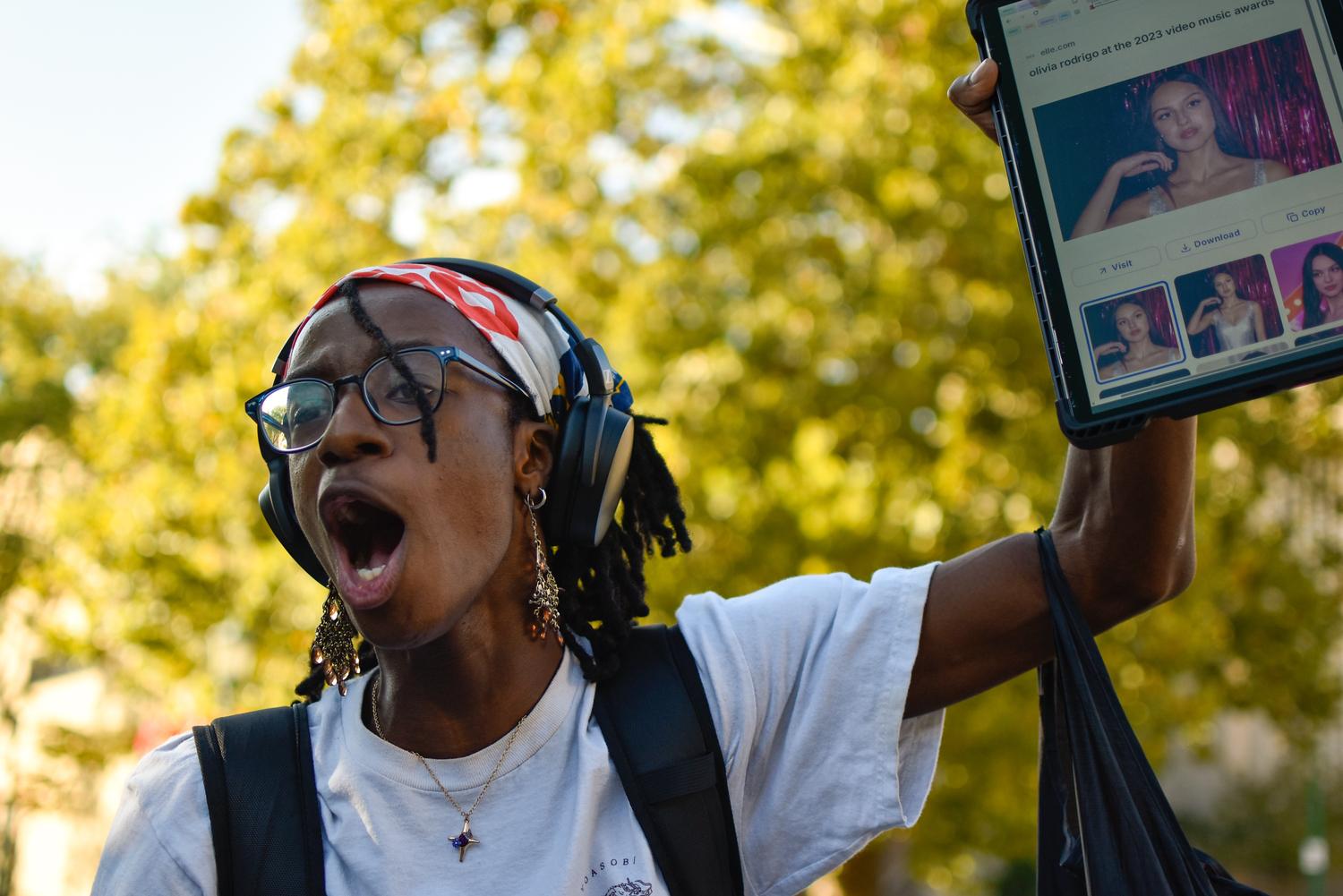Matchas, feminist literature and Clairo vinyls filled the Fine Arts Plaza on Friday as around 30 students lined up to compete for a coveted Dubai chocolate Labubu.
Over the next hour and a half, competitors — many dressed in thrifted outfits with baggy jeans and graphic tee shirts — threw tampons and pads to the crowd and played songs by Clairo and other indie artists.
From speeches to playing songs, all the competitors had one goal: to be named IU Bloomington’s most performative man.




The archetype of the “performative man,” has taken social media, specifically TikTok, by storm. A performative male, according to social media users, often pretends to enjoy reading books by women, drinking matcha lattes, carrying tote bags, listening to indie artists and wearing baggy pants, among other traits.

These activities and interests can seem harmless on their own, but IU freshman Tia Tsataros, one of Friday’s competition’s organizers, said it’s more than that.
“To me, a performative male is a person who craves female validation so bad that they change every aspect of their personality to just fit that role of what women want them to be as a man,” Tsataros said.
Tsataros and co-organizer freshman Ashi Agarwal said “performative men” are such a common occurrence that it seems like everyone they know has had an experience with one, including them.
“I’ve definitely had relationships with performative men as friends and as relationships,” Agarwal said. "It’s weird because you feel like they are going to understand you and they’re there for you and you’re like ‘wow you have so many of the same interests as me’ but they never really do.”
But not everyone online views the trend in a comedic light. Many have pointed out the harm that could come from making fun of men who engage in reading feminist literature and participating in other activities viewed as “performative.” If men are discouraged from engaging in these things, it could lead to an uprise in toxic masculinity and unhealthy gender stereotypes being put on these men.



Tsataros and Agarwal decided to organize the contest after attending an informal performative male contest held Sept. 5 at Showalter Fountain. The two heard about the original competition on the social networking app Yik Yak, but only around a dozen people showed up to watch and just two performative men competed.

Before Friday’s contest began, “performative” men roamed around Showalter Fountain showing off their vinyls and throwing tampons into the crowd — a common occurrence in other similar competitions happening across the country that pokes fun at performative men caring, or at least pretending to care, about women and their struggles.
The contest began when around 30 competitors lined up around the fountain. Each contestant got a turn to stand in front of the crowd and show off their outfit or talent.
Some people even came up and gave short speeches, with one competitor chanting, “no periods, no men, tampons free.” Some contestants received a roaring applause for their speeches, like when one person claimed to get a call from Michelle Obama telling him to stop promoting her book because she’s making too much money.


Others showed off entertaining talents like playing the guitar or, in the case of one participant, doing a magic trick where he made the card an audience member drew disappear and then reappear inside of an orange. The audience even got to sing along with one participant playing “Bags” by Clairo on his guitar.
Competition dwindled as the audience picked their favorites to continue. During the second round, which contained six participants, contestants were asked to define women in one word. One said “complex,” another “multifaceted,” but freshman Nathan Udal kept his mouth shut. A man should never define a woman, he said.

For the final round three contestants remained: freshman Dexter Smith and Adrian Chavez and Udal. For the final round contestants had to give a one-minute speech campaigning for themselves before the judges’ final decision.
The judges — Agarwal, Tsataros and two of their friends — wanted to find the most authentic performative man. One who actually believed the things they were talking about and liked the things they claimed to like, instead of putting on an act. And, after some deliberation, that’s what they found.
Following the finalists’ speeches, the judges huddled up for around a minute discussing who they thought was the most performative male at IU. After a drum roll and lots of anticipation from the audience, Agarwal announced the winner.

“The most performative man, on the IU Bloomington campus is... Dexter (Smith),” Agarwal said to the large crowd of attendees.
Smith had come straight to the competition from a club meeting where his friends had convinced him to go compete. He came in with no plan and no costume, just the outfit he had on that day and the stuff he had with him.
To Smith, a performative man is about more than just looks. They should be someone who appreciates women. He believes performative men should be men who don’t manipulate women, but instead truly care about them and aren’t embarrassed to be inspired by them.
“You know, I think it goes beyond being a performative man and this is really what a man should be like in general,” Smith said. “All men should behave the way that performative men try to behave.”

While the idea of performative men began as an internet joke, the trend has taken a positive turn for some people.
Udal, one of the other finalists, believes many performative men used the trend to try and take advantage of women, but now it seems to him that women are taking the trend back.
“What being a performative male to me is embracing the tradition of femininity that has gone completely up and over the moon over the last hundred years,” Udal said.
Being performative seems to be a good thing to some but bad to others. It all comes down to if they actually believe what they are preaching or not, Tsataros said.
“You can say you’re a performative man as a joke, you can dress the style, you can have the interests and all that,” Tsataros said. “But at the end of the day it really just depends on where your like ideals lie.”
CORRECTION: This story has been updated to correctly identify the contestant who did not speak during the second round.

Like what you're reading?
Support independent, award-winning student journalism.
Donate.